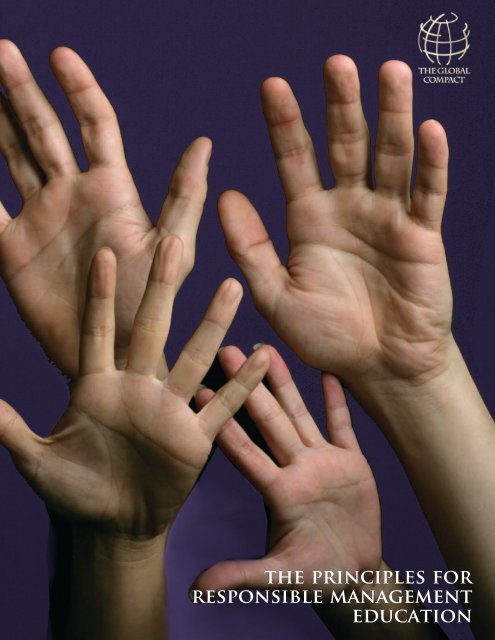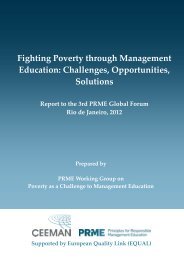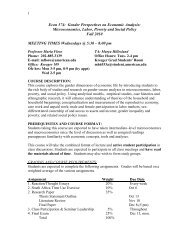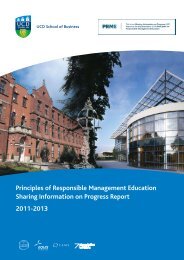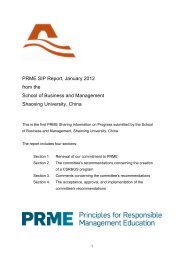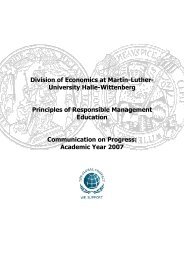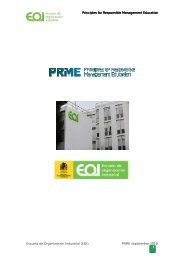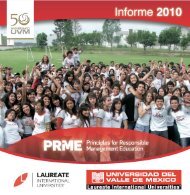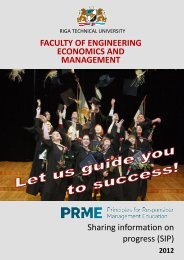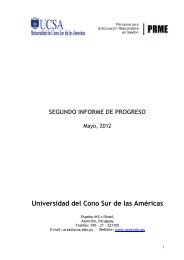ThE PRINCIPLES FOR RESPONSIBLE MANAGEMENT ... - PRME
ThE PRINCIPLES FOR RESPONSIBLE MANAGEMENT ... - PRME
ThE PRINCIPLES FOR RESPONSIBLE MANAGEMENT ... - PRME
You also want an ePaper? Increase the reach of your titles
YUMPU automatically turns print PDFs into web optimized ePapers that Google loves.
the principles for<br />
responsible management<br />
education
the principles for<br />
responsible management education<br />
July 2007<br />
Publication by the UN Global Compact<br />
Global Compact<br />
Launched in 2000, the UN Global Compact is the largest corporate citizenship initiative in the world. As of May<br />
2007 more than 3,000 companies from 100 countries, as well as over 700 hundred civil society, international<br />
labor organizations and academic institutions are engaged in the initiative. All are working to promote responsible<br />
corporate citizenship, ensuring that business is part of the solution to the challenges of globalization. In this way,<br />
the private sector – in partnership with other social actors – can help realize a more sustainable and inclusive<br />
global economy.<br />
unglobalcompact@un.org
Copyright<br />
Reproduction and use of this<br />
document is permitted without<br />
prior permission of the United<br />
Nations Global Compact Office<br />
provided there is proper attribution.<br />
contents<br />
Introduction 3<br />
The Principles for<br />
Responsible Management Education 4<br />
Call for Action 5<br />
Contributors 6
the principles for responsible<br />
management education<br />
introduction
the principles for responsible<br />
management education<br />
<br />
introduction<br />
In a churning global marketplace, understanding the fundamental<br />
connections between business, the environment, and<br />
society has become essential. The roles and responsibilities<br />
of business as a global force are becoming more urgent and<br />
complex, and concepts related to societal responsibility and<br />
sustainability are gaining recognition as essential elements in<br />
business management.<br />
Any meaningful<br />
and lasting change<br />
in the conduct of<br />
corporations toward<br />
societal responsibility<br />
and sustainability must<br />
involve the institutions<br />
that most directly act<br />
as drivers of business<br />
behavior, especially<br />
academia.<br />
Increasing complexity and interdependence require new<br />
approaches. Companies need integrative management tools<br />
that help embed environmental, social, and governance<br />
concerns into their strategic thinking and daily operations.<br />
They need support as they internalize and integrate these<br />
issues into the core of businesses, engage in dialogue with<br />
stakeholders, and report their conduct. They require talented<br />
and ethical leaders who can not only advance organizational<br />
goals and fulfill legal and fiduciary obligations to shareholders,<br />
but who are also prepared to deal with the broader impact and<br />
potential of business as a positive global force in society.<br />
Any meaningful and lasting change in the conduct of<br />
corporations toward societal responsibility and sustainability<br />
must involve the institutions that most directly act as drivers<br />
of business behavior, especially academia. Academic<br />
institutions help shape the attitudes and behavior of business<br />
leaders through business education, research, management<br />
development programs, training, and other pervasive, but less<br />
tangible, activities, such as the spread and advocacy of new<br />
values and ideas. Through these means, academic institutions<br />
have the potential to generate a wave of positive change,<br />
thereby helping to ensure a world where both enterprises and<br />
societies can flourish.<br />
Principle 1<br />
Purpose: We will develop<br />
the capabilities of<br />
students to be future<br />
generators of sustainable<br />
value for business and<br />
society at large and to<br />
work for an inclusive<br />
and sustainable global<br />
economy.
the principles for responsible<br />
management education<br />
the principles for<br />
responsible management<br />
education<br />
As institutions of higher learning involved in the education of current and future managers<br />
we are voluntarily committed to engaging in a continuous process of improvement<br />
of the following Principles and their application, reporting on progress to all our stakeholders<br />
and exchanging effective practices with other academic institutions:<br />
Principle 1<br />
Purpose: We will develop the capabilities of students to be future generators of sustainable<br />
value for business and society at large and to work for an inclusive and sustainable<br />
global economy.<br />
Principle 2<br />
Values:<br />
We will incorporate<br />
into our academic activities<br />
and curricula<br />
the values of global<br />
social responsibility<br />
as portrayed in<br />
international initiatives<br />
such as the<br />
United Nations<br />
Global Compact.<br />
Principle 2<br />
Values: We will incorporate into our academic activities and curricula the values of<br />
global social responsibility as portrayed in international initiatives such as the United<br />
Nations Global Compact.<br />
Principle 3<br />
Method: We will create educational frameworks, materials, processes and environments<br />
that enable effective learning experiences for responsible leadership.<br />
Principle 4<br />
Research: We will engage in conceptual and empirical research that advances our<br />
understanding about the role, dynamics, and impact of corporations in the creation of<br />
sustainable social, environmental and economic value.<br />
Principle 5<br />
Partnership: We will interact with managers of business corporations to extend our<br />
knowledge of their challenges in meeting social and environmental responsibilities and to<br />
explore jointly effective approaches to meeting these challenges.<br />
Principle 6<br />
Dialogue: We will facilitate and support dialogue and debate among educators, business,<br />
government, consumers, media, civil society organizations and other interested groups and<br />
stakeholders on critical issues related to global social responsibility and sustainability.<br />
We understand that our own organizational practices should serve as example of the<br />
values and attitudes we convey to our students.
the principles for responsible<br />
management education<br />
<br />
call for action<br />
Global responsibility is a process from emerging<br />
awareness to action. It is based on the richness,<br />
diversity and varying contexts of our world, and it<br />
is a process of participation and involvement of the<br />
main change agents.<br />
The United Nations<br />
Global Compact<br />
hereby calls all<br />
institutions and<br />
associations of<br />
higher learning<br />
dedicated to the<br />
education of<br />
business leaders<br />
to endorse this<br />
process and to<br />
participate actively<br />
in a global platform<br />
for responsible<br />
management<br />
education.<br />
The United Nations Global Compact hereby calls<br />
all institutions and associations of higher learning<br />
dedicated to the education of business leaders to<br />
endorse this process and to participate actively<br />
in a global platform for responsible management<br />
education.<br />
The role of the platform will be to advocate responsible<br />
management education and coordinate efforts<br />
to further develop these Principles by the agents<br />
that can generate change: management-related<br />
academic institutions and their associations.<br />
To that effect a world gathering of management<br />
educators including professors, deans and associations<br />
involved in the advancement of management<br />
education will be convened.<br />
To advance this effort, all business schools whose<br />
representatives have participated in the drafting of<br />
these Principles are invited to consider the adoption<br />
of the Principles.<br />
Principle 3<br />
Method:<br />
We will create<br />
educational frameworks,<br />
materials, processes and<br />
environments<br />
that enable<br />
effective<br />
learning experiences for<br />
responsible leadership.
the principles for responsible<br />
management education<br />
Contributors<br />
This document has been prepared in an open dialogue among the co-convening institutions and an international<br />
task force of business educators with the active collaboration and support of a number of international<br />
organizations.<br />
Co-convening Organizations<br />
UN Global Compact<br />
Manuel Escudero • Head Global Compact Networks • UN Global Compact Office<br />
Ángel Cabrera • Senior Advisor Academic Affairs • UN Global Compact Office<br />
AACSB International – Association to Advance Collegiate Schools of Business<br />
John Fernandes • President and CEO • AACSB International<br />
Anne Graham • Special Assistant to the President and CEO • AACSB International<br />
Carolyn Woo • Dean, Mendoza College of Business • University of Notre Dame<br />
The Aspen Institute’s Business and Society Program<br />
Principle 4<br />
Research:<br />
We will engage in<br />
conceptual and<br />
empirical research<br />
that advances our<br />
understanding about<br />
the role, dynamics,<br />
and impact of<br />
corporations in the<br />
creation of<br />
sustainable social,<br />
environmental and<br />
economic value.<br />
Judith F. Samuelson • Executive Director • The Aspen Institute’s Business and Society Program<br />
European Foundation for Management Development (EFMD)<br />
Eric Cornuel • Director General and CEO • EFMD<br />
Anders Aspling • Director / Secretary General • Global Responsibility Initiative / Globally Responsible<br />
Leadership Initiative<br />
Globally Responsible Leadership Initiative (GRLI)<br />
Mark Drewell • Chair / Group Executive • GRLI / Barloworld<br />
Pierre Tapie • Vice-Chair / President • GRLI / ESSEC Business School<br />
Net Impact<br />
Liz Maw • Executive Director • Net Impact<br />
Task force Members<br />
Ángel Cabrera • President • Thunderbird School of Global Management, USA (Chairman of the Task force)<br />
Salem Al-Agtash • Dean • School of Informatics & Computing Technology, Talal Abu Ghazaleh College<br />
of Business, German-Jordanian University, Jordan<br />
Mirza Raza Ali • Director • Newports Institute of Communications and Economics, Pakistan<br />
Jim Austin • Snider Professor of Business Administration, Emeritus • Harvard Business School, USA<br />
Jaime Alonso Gomez • Dean • EGADE, Tecnológico de Monterrey, Mexico<br />
Walter Baets • Associate Dean for Research, MBA Director • Euromed Marseille - Ecole de Management, France<br />
Rolph Balgobin • Executive Director • Arthur Lok Jack Graduate School of Business, Trinidad and Tobago, W.I.<br />
Bernardo Barona Zuluaga • Dean • Facultad de Ciencias Económicas y Administrativas, Universidad<br />
Javeriana Sede Cali, Colombia<br />
Frank Brown • Dean • INSEAD, France
the principles for responsible<br />
management education<br />
<br />
Rolf D. Cremer • Dean and Vice President • CEIBS – China Europe International Business School, China<br />
David Cooperrider • Chairman • Center for Business as Agent of World Benefit, Weatherhead School of<br />
Management, Case Western Reserve University, USA<br />
Norman De Paula Arruda Filho • General Director • Getulio Vargas Foundation, Advanced Institute of<br />
Administration and Economics, Brazil<br />
Thomas W. Dunfee • Chairperson • Legal Studies and Business Ethics Department, Wharton School, USA<br />
Joan Fontrodona • Academic Director • Center for Business in Society, IESE Business School – University<br />
of Navarra, Spain<br />
Miguel Angel Gardetti • Director • Instituto de Estudios para la Sustentabilidad Corporativa, Argentina<br />
Ernesto Garilao • Executive Director • Mirant Center for Bridging Societal Divides, Asian Institute of<br />
Management, Phillipines<br />
Joaquín Garralda Ruiz de Velasco • Associate Dean • MBA, Instituto de Empresa, Spain<br />
Matthew Gitsham • Principal Researcher • Ashridge Centre for Business and Society, Ashridge Business<br />
School, United Kingdom<br />
Roberto Gutiérrez • Associate Professor • Universidad de los Andes, Colombia, and Social Enterprise<br />
Knowledge Network (SEKN) Coordinator<br />
Principle 5<br />
Jean Pierre Helfer • Dean • Audencia, France<br />
Ira A. Jackson • Dean • Peter F. Drucker and Masatoshi Ito Graduate School of Management, USA<br />
Tarun Khanna • Harvard Business School, USA<br />
Ildiko Kostyak • Non-Corporate Relations Manager • AIESEC<br />
Peter Lacy • Executive Director • European Academy of Business in Society<br />
Gilbert Lenssen • President • European Academy of Business in Society<br />
Kellie McElhaney • Executive Director • Haas School of Business, USA<br />
Malcolm McIntosh • Director • Futures Institute, Applied Research Centre in Human Security (ARCHS),<br />
Coventry University, United Kingdom<br />
Alan Murray • Chair Special interest Group in CSR • British Academy of Management, UK<br />
Ceri Oliver-Evans • Director • The Southern Africa-United States Centre for Leadership and Public<br />
Values, Graduate School of Business, University of Cape Town, South Africa<br />
Joel Podolny • Dean • Yale School of Management, USA<br />
Danica Purg • Dean • IEDC-Bled School of Management, Slovenia<br />
Yingyi Qian • Dean • School of Economics and Management, Tsinghua University, China<br />
Partnership:<br />
We will interact with<br />
managers of business<br />
corporations to extend<br />
our knowledge of their<br />
challenges in meeting<br />
social and environmental<br />
responsibilities and to<br />
explore jointly effective<br />
approaches to meeting<br />
these challenges.<br />
Casimir Raj • Director • School of Management and Human Resources, XLRI Jamshedpur, India<br />
David Saunders • Dean • Queen’s School of Business, Canada<br />
Richard Schmalensee • Dean • MIT Sloan School of Management, USA<br />
Greg Unruh • Director • Lincoln Center for Ethics in Global Management, Thunderbird School of Global<br />
Management, USA
the principles for responsible<br />
management education<br />
Ruben Vardanian • President • Moscow School of Management-Skolkovo, Russia<br />
James P. Walsh • Stephen M. Ross School of Business, University of Michigan, USA<br />
Patricia Werhane • Director • Institute for Business and Professional Ethics, DePaul University, USA<br />
Wayah S. Wiroto • Vice Rector for Collaboration and Marketing • Bina Nusantara University, Indonesia<br />
Weiying Zhang • Dean • Guanghua School of Management, Peking University, China<br />
Semra Feriha Ascigil • Middle East Technical University, Turkey<br />
Claudio Boechat • Fundacao Dom Cabral, Brazil<br />
Dilek Cetindamar • Faculty of Management, Sabanci University, Turkey<br />
Young-Chul Chang • Department of Management, Kyunghee University, South Korea<br />
Marco Frey • SDA Bocconi, Italy<br />
Rajeev Gowda • Indian Institute of Management, Bangalore, India<br />
Josep M. Lozano • Institute for Social Innovation, ESADE Business School, Spain<br />
Principle 6<br />
Dialogue:<br />
We will facilitate and<br />
support dialogue and<br />
debate among<br />
educators, business,<br />
government,<br />
consumers, media,<br />
civil society organizations<br />
and other interested<br />
groups and stakeholders<br />
on critical issues related<br />
to global social responsibility<br />
and sustainability.<br />
Joshua Margolis • Harvard Business School, USA<br />
Atle Midttun • Norwegian School of Management, Norway<br />
Ingo Pies • Martin-Luther University Halle-Wittenberg, Germany<br />
Jenik Radon • Columbia University, USA<br />
Lothar Rieth • Darmstadt University of Technology, Germany<br />
Violeta Schubert • University of Melbourne, SAGES, Australia<br />
Eugene Tan • Singapore Management University, Singapore<br />
Mitsuhiro Umezu • Keio University, Japan<br />
Sandra Waddock • Boston College, USA<br />
We specially thank those members of the Academy of Management who have contributed and support<br />
this set of Principles.<br />
Supporting Organizations<br />
AIESEC<br />
European Academy for Business in Society (EABIS)<br />
Sponsoring Organizations<br />
Center for Business as Agent of World Benefit (at Weatherhead School of Management, Case<br />
Western Reserve University)<br />
Euromed Marseille - Ecole de Management<br />
Lincoln Center for Ethics in Global Management (at Thunderbird School of Global Management)<br />
Overall coordination<br />
Jonas Haertle • Coordinator Academic Initiatives • UN Global Compact Office
Co-convening<br />
organizations<br />
global compact principles<br />
The United Nations Global Compact asks companies to embrace, support and enact, within their sphere of influence,<br />
a set of core values in the areas of human rights, labour standards, the environment and anti-corruption. The<br />
principles are as follows:<br />
Human Rights<br />
Principle 1 Businesses should support and respect the protection of internationally proclaimed human<br />
rights; and<br />
Principle 2 make sure that they are not complicit in human rights abuses.<br />
EFMD<br />
Labour<br />
Principle 3 Businesses should uphold the freedom of association and the effective recognition of the<br />
right to collective bargaining;<br />
Principle 4 the elimination of all forms of forced and compulsory labour;<br />
Principle 5 the effective abolition of child labour; and<br />
Principle 6 the elimination of discrimination in respect of employment and occupation.<br />
Environment<br />
Principle 7 Businesses should support a precautionary approach to environmental challenges;<br />
Principle 8 undertake initiatives to promote greater environmental responsibility; and<br />
Principle 9 encourage the development and diffusion of environmentally friendly technologies.<br />
Supporting<br />
organizations<br />
Anti-Corruption<br />
Principle 10 Businesses should work against corruption in all its forms, including extortion and bribery.<br />
rnational platform for young people to discover and develop their potential<br />
Sponsoring<br />
organizations<br />
Published by the United Nations Global Compact Office | unglobalcompact.org<br />
contact: unglobalcompact@un.org<br />
July 2007 | 2.5M


